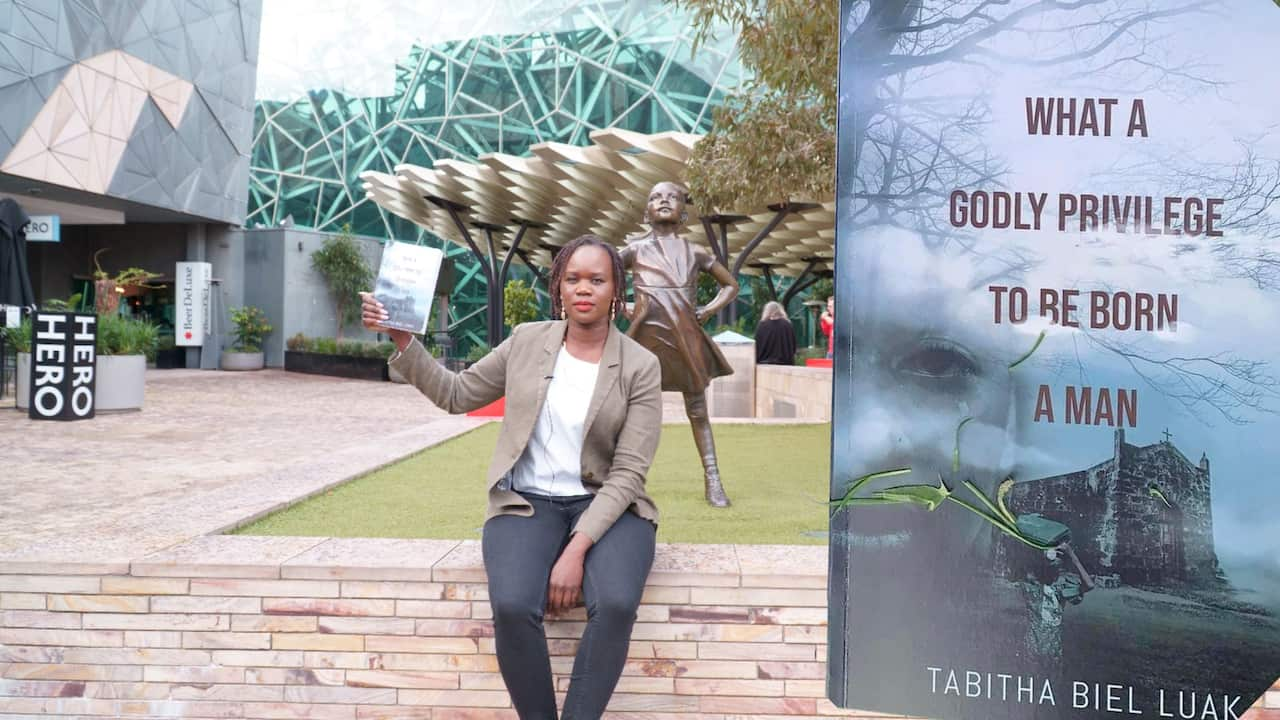

This article is more than 2 years old
'We cannot say it's OK for a child to be raped or married at a young age'
Tabitha Nyaziel calls for an open debate among the South Sudanese communities about the role of young girls and women. WHAT A GODLY PRIVILLGAE TO BE BORN A MAN was launched last week in Melbourne, Australia.
Published 16 August 2022 5:19pm
Updated 16 August 2022 5:21pm
By Ajak Deng Chiengkou
Source: SBS
Image: Tabitha Nyaziel with the members of the community during the book launching event
Highlights
- Open debate among the South Sudanese communities about issues affecting young girls and women
- Dowry payments, forced marriage, raping, and other practices
- Calls for the change of attitudes regarding girls' upbringing
The event was streamed on social media, and men could participate in the debate. Tabitha wanted an inclusive discussion to allow men to understand some of the practices within these cultures and how they affect women.
This is our hope that you can see things from our home standpoint and see how we've been suffering for far too long. So, the whole thing about the book itself, the inspiration, is the struggle that I become part of and so many other women. It is just a time for us where we cannot keep going, knowing the wrongs are being committed and understanding why they're being committed, and nobody says anything. So, this is just to say something and start the conversation.

Our culture, as you guys know, is so beautiful and unique. That's not the part where iam disagree with people. We will have all the parts that kind of make it beautiful. But the problem is we cannot normalise rape. We cannot say it's OK for a child to be raped. We can't say that for eight years old to be married. We cannot do that. That's not normal. We cannot use cows as the reason.
Nyadol William Nyuon, a lawyer, and activist who voiced her concerns on issues affecting women within the South Sudanese communities or in Australia, also attended the launching of the book last week. Nyadol calls for a change of attitudes regarding girls' upbringing. As she loud the book as the debate starter, Nyadol said girls also have dreams and should be supported.

Growing up, I wasn't encouraged to be strong, and I was told to aim to be someone's wife. Women are not just born to be mothers or to be just wives. We also have dreams. Some of them want to become lawyers, some of them want to become doctors, and some of them want to become judges. This is the world that we live in now…. We need you to teach us that we are good enough.
Tabitha is challenging the concept of inheritance of wives, which happens when a woman is widowed; in Nuer and Dinka cultures and other South Sudanese cultures, she would have no choice of who to marry outside the family line of her late husband. The reasons given by the Nuer and the Dinka are that they would love to keep their bloodline, but that comes at cause too many women.
So, when it's women, what do they do? They said you could not be remarried when your husband was dead. Your family will not release the cow, which means you cannot be freed to go and remarry to somebody else. So, what they do is that they pass you to somebody/relative who is alive, right? If the husband passes away, they don't give you to your father-in-law, but when the husband has a son that died, you will be given to his son or his brother to keep the property around.

I want my family to be able to survive. I'm going to come into the family to be married by who? If we belong to that village, someone else survives more than another. Why can't you share what they have instead of cheering kids? Can they do that, boy? You know, a boy grows up. Up until what? When they are 30 years old, that is when they decide who to play with and decide who to be married to. As girls, we don't have the privilege to decide that this is someone for the rest of our life; we're going to live with that person. We don't have it. We are just being thrown from one thing to another. Just keep going.

Being a man has been used as a privilege to take advantage of the innocent. Whether you are talking about women, children, or resources, man has taken advantage of being a man. He has used that advantage to take advantage of the people that he, in his nature, perceived as weak or unable to do anything whatever time is that he perceived it to be. in that regard what.
Mary Riek, who came to Australia in the 1990s, has seen much in the western world, but she appreciates the debate created by this book. She saw the interaction between men and women during the book lunch as a healthy interaction that should continue to help stamp out bad practices.
The men need to critically question their Godly privileges to reflect on whether they are using them to benefit or damage the nation by using their powers over the girls and the women inappropriately. But I think this book is the beginning for us to question our cultural practices, especially what we can have and what we can let go.

I encourage that we should take this debate seriously. I'm so happy that some community leaders are here who can also go out and encourage other men groups to open this conversation and empower our women. A community without stronger women will never progress anywhere.
Share
